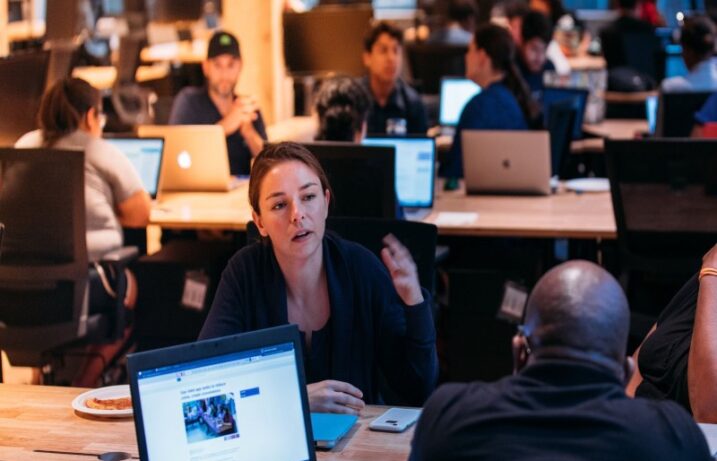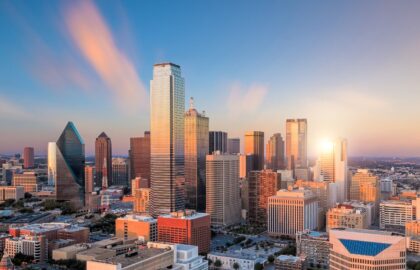A city’s tech community doesn’t appear overnight. It takes time, investment, and support from companies and local government. Add in smart, talented people with technical skills and you have the makings of a vibrant tech ecosystem.
Flatiron School is seeing this happen in Houston and we’re excited to be a part of the city’s burgeoning tech community. There’s an incredible demand for software engineers and data scientists throughout the city. Here’s what’s the tech community in Houston is like.
A thriving tech scene, a thriving city
A robust startup ecosystem can add billions of dollars in investment to a city along with tens of thousands of jobs. Take Chicago for example. Chicago launched 1871, a tech and entrepreneurship center, in 2012 to spur innovation in the city. 1871, paired with the city’s embrace of innovation, has led to 40,000 new jobs since 2011 and over $1.7 billion in venture capital funding.
That tech ecosystem also creates jobs outside the industry. Each new high-tech job in the U.S. leads to the creation of five new jobs in various industries, says economist Enrico Moretti. Apple, for example, directly employs approximately 13,000 people in Cupertino, and the tech giant has led to the creation of 70,000 jobs in the city, according to Moretti.
Houston’s tech scene can will benefit from its own innovation district and by leveraging its existing talent pool and industries.
“We have a lot of smart people in Houston. We have the second highest concentration of engineers in the US working in industries like oil and gas, aerospace, and construction. We have the largest medical center in the world, the Texas Medical Center, with institutions like MD Anderson Cancer Center and Texas Children’s Hospital. We have world-renowned researchers here and, of course, NASA,” said Payal Patel, Director of Business Development at Station Houston, a technology innovation and entrepreneurship hub.

Through these recent surges in innovation, a vast network of techies in the city, and a ripe investment ecosystem, Houston’s reputation as a strictly “oil and gas” city is changing quickly, and for the better.
Houston’s tech scene today
Every company needs to have well-trained tech talent as part of a job corps that’s prepared for the present and the future. Shell, Chevron, and JP Morgan Chase are among Houston’s largest employers and they all have openings for tech talent. These companies are not alone in hiring tech talent and new startups are forming to help solve problems for these large industries.
Payal has seen entrepreneurs launch startups to solve everyday problems in oil and gas, heavy manufacturing, logistics, and transportation. These large industries are adding to a new tech ecosystem that is creating even more tech opportunities. As Houston’s tech scene matures, more startups are expected to launch that fall outside these preexisting industries.
One way to do that is by investing in the city itself and empower the tech scene as it continues to grow. The city of Houston is already working to ensure the future of its tech scene by partnering with Rice University and Station Houston to launch an innovation district.
Houston’s tech future
The innovation district highlights how important Houston’s burgeoning tech scene is to the city. Innovation leads to new jobs, billions of dollars of investment, and a more diversified local economy that lends itself to long-term stability.
Station Houston is nurturing the tech scene by acting as an incubator to over 200 startups. The innovation hub also hosts career fairs and networking events to connect companies with tech talent. The new innovation district will build on this success and currently has the support of local elected officials, Rice University, Station Houston, and other partners. The innovation district will be housed in an old Sears building owned by Rice. “It will be a place where builders, innovators, and ideators can come together and work on important enterprise problems,” said Payal.

The innovation district will be as collaborative and inclusive as Houston itself. Payal envisions the old Sears building being home to a whole range of companies and even coding bootcamps. While the investment in Houston’s tech scene will lead to new opportunities, Payal recommends having a mix of hard and soft skills to stand out as a candidate. Emotional intelligence, strong communication skills, and great project management skills are as important as coding skills.
At Flatiron School, we’re proud to be a part of Houston’s rapidly growing tech scene. We’re excited to help transform the city through inclusive events and empowering the future of Houston’s scene today.




